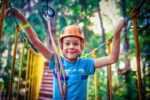For most people, camp involves tales of first crushes, canoes, bunk beds and bug bites. We write postcards and letters back home. But Brandeis University scholar Jonathan Krasner has co-authored an actual book about camp, “Hebrew Infusion,” detailing how summer camps adopted Hebrew not for proficiency but to cement Jewish identity and attitudes in post-war America.
As a researcher, he’s also an expert on the history of Jewish summer camps overall, digging beneath the fun memories to trace their ethnographic origins. He talked to JewishBoston about how camp originated and evolved, and the role it plays in modern childhood.
Tell me about your research and your book, “Hebrew Infusion.”
My colleagues Sarah Bunin at Hebrew Union College, Sharon Avni at City College of New York and I wrote a book that was published last year called “Hebrew Infusion,” which is really about Hebrew use in Jewish summer camps. We looked at over two dozen summer camps across the United States, different denominations and affiliations and different regions of the country. We did site visits to these camps, and we also did a larger survey of the camps, including camps we didn’t visit. It doesn’t capture every single camp, but it is statistically valid in terms of what we found.
What did you ask?
We asked questions about the kind of Hebrew they use at their camp and what their goals were in using Hebrew at camp. We were able to, through both the survey and through our observation, talk a little bit about what the purpose is and how Hebrew acts in various ways in summer camps. I’m a historian, so I was able to trace the use of Hebrew in summer camp back quite a bit.
Let’s talk about the history of summer camps, because I know you’re a specialist. When did Jewish summer camp start getting popular, and why did parents start sending their kids there?
In the 20th century, Jews started sending their kids to summer camps. Also at the beginning of the 20th century, many camps had restrictions around religion. So Jews set up their own summer camps, because Jewish kids weren’t really welcome at Christian summer camps. A lot of these early camps were religious.
There were two types of summer camps set up from the beginning. One type of summer camp was mostly for middle-class, upper-middle-class kids. The idea was, with the increase in urbanization, and with the increase in leisure time, people were going to the country on vacation. The idea was you could send your kid to a camp while you go up to the mountains. In the early 20th century, as people were becoming more urban, they were losing touch with nature. The idea was to introduce kids to the great outdoors and to a wholesome environment, and to get them out of the city for the summer. So that was one group of people who started going to summer camp. The other people who were going to summer camp were children of immigrants.
Tell me about that.
In the early 20th century, there were a lot of Jewish immigrants, along with a flood of other immigrants from Europe, and a lot of them lived in very congested parts of cities. There were philanthropic agencies that started sending those kids off to summer camp for a few weeks, in order to, again, expose them to the great outdoors, to Americanize them, to give them the opportunity to eat wholesome food. So that was really how it started—the middle-class track and the immigrant track.
What happened next?
By the 1920s, there was a recognition that Jewish camps, just like non-Jewish camps, could also be used for educational and ideological purposes, so you began to have Zionist summer camps, you began to have Jewish culture camps and you began to have camps that were Yiddish-speaking. So that was the next stage in the development of camping, and more people started sending their kids to camps. But it really didn’t explode in popularity until after World War II, as Jews were becoming more middle class and had more disposable income.
They began sending their kids to camps in larger numbers. And that was really the time when the Conservative movement opened up their Ramah camps, and the Reform movement opened up the URJ camps and a lot of federations and JCCs [opened camps]. Some of those federation camps, by the way, date to the beginning of the 20th century. Some of them started out as camps for philanthropic purposes for those immigrant kids I was talking about. But then, camping had really become mostly a middle-class endeavor, and it really wasn’t so much a philanthropic thing anymore, even though some offered scholarships for needy kids. But, really, it wasn’t noblesse oblige anymore.
Where did this mostly happen?
Jews were not distributed evenly around the country post-World War II. Jews were mostly living in the Northeast and in the Midwest, and that’s also where non-Jews were sending their kids to summer camps in the greatest numbers. They were, to some extent, really following the trends: Boy Scout camps and YMCA camps. These camps became more popular.
What I would say, though, is that it really wasn’t until the 1990s when Jews began to be very concerned about our continuity and about assimilation. There was a notorious population study that was done in 1990 that showed a 52% intermarriage rate. There was a certain amount of—I don’t think it’s too strong a word—hysteria in the Jewish community about survival. I think people were really looking for magic bullets that were going to ensure Jewish survival. People knew from the data that, if you send your kids to day school, there were good outcomes in terms of Jewish continuity.
But the problem with a Jewish school education is it’s really expensive. It was an attempt to try to look at other kinds of settings that could also move the dial on Jewish continuity. People began to look at summer camps, along with Israel trips and other kinds of experiences, as potential interventions that could positively affect Jewish identity. That was also around the same time that the Foundation for Jewish Camp was established. It really didn’t get off the ground until the early 2000s. It has been very active, not only in promoting the development of new camps through an incubator program, but they’ve also been active in training camp staff. They’ve [also] been supporting, through scholarships, kids who either can’t afford to go to camp or haven’t gone to camp in order to incentivize it.
What’s an important takeaway for people who are looking at camps this year, especially in terms of your book?
We were able to document that there were a lot of camps that use various amounts of Hebrew in the day-to-day life of camp. And one of the things that is documented through my historical research is that there was actually a time, around when the State of Israel was created, when there were a number of camps that for ideological reasons really wanted to teach kids the Hebrew language so they could be proficient in Hebrew. What we found and what parents might be surprised about is that the vast majority of Jewish camps today that use Hebrew are not really interested in proficiency. They’re not really interested in the kids being fluent Hebrew speakers when they come home.
What are they interested in?
They’re interested in promoting positive association with the Hebrew language, with the State of Israel, with Jewish ritual, and also they’re interested in making camp fun. And one way of making anything fun, if you’ve ever belonged to a secret society, or if you ever belonged to a club when you were younger, [is that] people have secret handshakes or secret languages. Hebrew kind of performs in that way at camp. It’s like an insider language that people use; it’s a way of inducting kids into camp life and the world of camp.
It’s not done in a way where people are penalized, but it’s usually done in a fun way. People want to play along, and before you know it, even if you’ve never been to the camp before, by the second or third week of camp, you’ve picked up on the fact that place names at camp are referred to by their Hebrew names or that some might have a Hebrew name instead of an English name.
For example, Ben Platt, the Broadway star, was on one of the late-night shows and actually sang some verses from a Hebrew “Guys and Dolls.” He was talking some Hebrew lingo. And [Seth Meyers] recognized him as a member of the tribe. There was also a cute Jdate commercial where they’re speaking camp lingo. There was a person who goes out on a date with somebody, and they don’t know the lingo. That person is like, “Oh, this person is not for me.” But then they sit down with the second person, and that person does know the lingo, and they have an instant connection to each other.
Another part of this is that camps began bringing Israeli staff to work at camp. This started in the late 1960s, but it really became very popular in the last 20 or 30 years. These people are supposed to be ambassadors of Israel and supposed to bring a piece of Israel to camp and make the kids interested in Israel. Hebrew as the language of Israel is part of that larger pastiche.
What would you say to parents who are on the fence about sending their kids to camp? As someone who’s observed a lot of Jewish camps, how do you find the right fit?
First of all, I would say that Jewish summer camps are one of the most positive, joyful places where Jewish kids can live their Judaism and be around other Jewish kids. I don’t want to give Hebrew school a bad rap. But in some respects, [camp] is the antithesis of Hebrew school, right? The environment is much more permissive—the great outdoors, fewer rules. It doesn’t feel like a school environment. It’s a way of acculturating kids or socializing kids into Jewish life, but not in a formal classroom environment.
I would also say that there’s a great variety of Jewish camps out there, and that especially people in the Boston area have a lot of flavors to choose from, and there’s bound to be a camp that speaks to your particular interests. I also think that, if you care about Judaism, and if you’re interested in promoting positive associations with Judaism in your kids, send them to a place where chances are they’re having a good time.
This interview has been edited and condensed.
Find a directory of Jewish overnight camps here.











